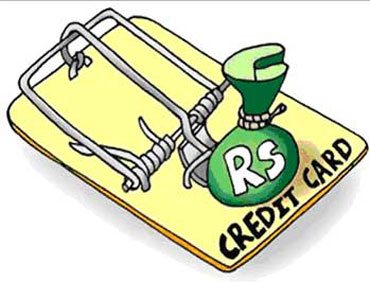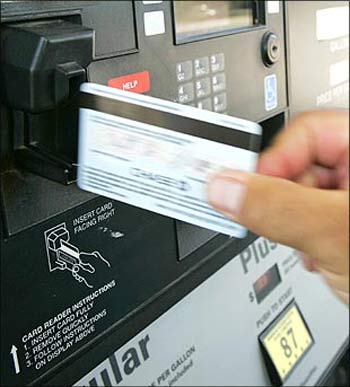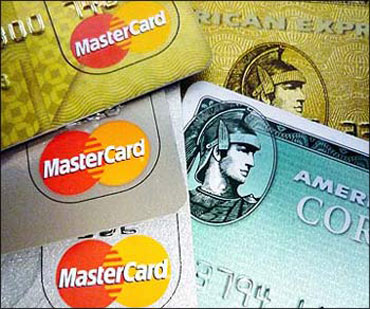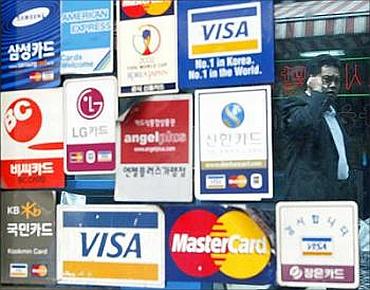
One of results of the boom in the retail credit space was the explosion of plastic -- especially credit cards -- in the first decade of this century.
According to a report, Payment Card Industry 2009, by Venture Infotech Research, a consumer payment processing company, the number of credit card users in India saw a steady increase since 2001 to reach a peak of around 27.5 million cards in 2007-08.
Since then, credit card issuers have been facing a crunch, as the credit card base declined during the year ending March 2009 to 24.7 million from the previous year's high.
The study further states that an increasing delinquency rate is likely to make card-issuing banks more hesitant in issuing new cards. This, to a great extent, is true because banks are now more careful in assessing an individuals credit history before issuing a card. Further, some banks have withdrawn the lifetime-free facility on all their cards.
No longer lifetime free. Banks had introduced the lifetime-free feature on select credit cards with the aim of gaining market share.
However, the global financial crisis forced them to take a hard look at their credit card segment as the number of delinquencies shot up. ICICI Bank was among the first banks to withdraw the lifetime-free feature.
Taking cue, other banks, too, have started charging fees even for entry-level credit cards. State Bank of India (SBI), which runs its credit card segment in a joint venture with GE Capital Services, has started charging for its entry-level cards.
. . .

Even Standard Chartered bank has withdrawn gold cards from its shelf and, for the premium segment, it has retained just the platinum card. So, now that you have to pay a fee to get a credit card, you need to keep a few things in mind before you apply for one.
Take A Look At These
Answering a few questions and doing a little bit of research will ensure that you reap the maximum benefits associated with the credit card.
Do I need a credit card? During the lifetime-free days, not many thought before applying for a fresh card. After all it did not cost you anything. Now, you need to be very clear why you want the credit card.
For example, if you plan to use the credit card for tanking up your car, make sure you apply for one that has a tie-up with any of the oil companies. To give you an idea, Citibank offers a credit card in association with Indian Oil; ICICI Bank offers a credit card in association with Hindustan Petroleum.
The benefit with these cards is that you do not have to pay the fuel surcharge for using the card at select petrol stations and, on top of that, you earn points for every rupee you spend purchasing petrol through the card.
If these co-branded cards do not interest you, you can choose from cards which offer surcharge waiver across petrol pumps. For example, with the SBI credit card, you can tank up your car at any petrol pump without paying any fuel surcharge.
Your credit report. Even before you apply for a credit card, it's important that you get a copy of your credit report, especially if you have defaulted on loan repayments in the recent past.
. . .

The reason being, apart from verifying your details from the documents that you give while applying for a credit card, card-issuing banks also take a look at how you have been servicing your lines of credit with other institutions. If your credit history is good, chances of you getting a credit card are high.
What is the insurance? Even when lifetime-free credit cards were there, on select cards, typically Platinum and above, an annual fee and joining fees had to be paid. In return, among other things, the bank provided the individual an insurance cover.
For example, ICICI Bank Ascent American Express Card offers an air accident insurance of up to Rs 1 crore (Rs 10 million).
On the other hand, the ICICI Bank Platinum Credit Card provides an air accident insurance of up to Rs 40 lakh (Rs 4 million). So, it makes sense for you to check the nature of insurance the credit card provides.
Rewards/loyalty programme. The rewards and loyalty programme takes your card-usage experience to another level. Some banks, such as SBI, also provide exclusive offers for select credit card holders under their privilege circle programme.
Also, some card-issuing banks provide instant cash-back on purchases at select outlets. So, spend a little time understanding these benefits.
The fees. Check the price at which a card is being offered. "If the benefits are high, one should be ready to pay a slightly higher price for it," says Pushpendra Mehta, country principal, VCherish Consultancy, a financial services consultancy.
. . .

The price is an important factor, but it should not be the deciding one. Weigh the benefits that the credit card provides against the price and make your choice.
Rate of interest. This is one factor that should not worry you much if you are in the habit of servicing other lines of credit on a regular basis.
However, it does makes sense to take a look at interest rates, because instances of individuals not being able to service a line of credit due to circumstances beyond their control are not rare. When you are unable to pay a credit card bill on time, the rate of interest comes into effect. Typically, choose a credit card where the rate of interest is lower.
Credit limit. When you apply for a credit card, the card-issuing bank, after assessing your credit profile, will provide you a credit limit. On your part, however, you should be very clear as to how much credit limit you want on your card.
If you do not wish to have a huge line of credit, choose entry-level credit cards, such as a silver or a gold credit card. However, if you wish to have a huge line of credit, go for higher value cards such as a titanium credit card or a platinum credit card.
Free credit days. In India, typically, the free credit period can be up to 52 days. Ideally, choose the card that offers a higher number of free credit days. Higher the number of free credit days, the more time you get to pay for the card purchase during a particular billing cycle.
. . .

Bill payment options. The higher the number of bill payment options, the greater is the convenience to you. Some of the common payment options are through cheque, online payment, through ECS, and cash over the counter. However, banks typically charge a small fee if you pay cash over the counter.
Others' experience. Check the experience of people who have been using the same card that you wish to apply for. Some of things that you should check with them are the ease of making bill payments, customer service and promptness in billing.
All you need is a little bit of research before you zero down on a credit card. The more you do your homework, the better it will be for you. After all, you can enjoy the benefits of the card only when you know fully well what it offers.
No Freebies
The number of credit card users reached the peak of around 27.5 million in 2007-08.
Since then, credit card companies have faced a crunch, largely due to the meltdown, with the number declining to 24.7 million in 2009.
The increasing delinquency rate has made card-issuing companies hesitant in issuing new cards.
. . .

Choosing the right card
Credit cards are no longer a luxury. In fact, over the years, they have become a necessity. But if you are not careful enough, you may end up losing some hard-earned money or fall into a debt trap. We take a look at a few must-dos: